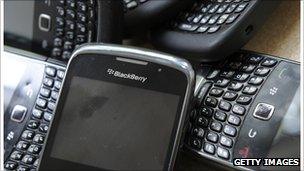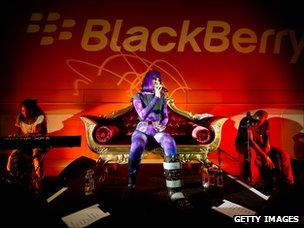Will Blackberry crumble?
- Published

Blackberry helped create the smartphone revolution but is being gradually eclipsed.
Blackberry has had an annus horribilis. Scratch that. It's had several anni horribili.
They started when Apple came along and threw a perfectly engineered bomb into the bit of its business that deals with business.
For at least a decade, besuited city types spent every spare minute twirling their way through corporate emails and pecking out responses.
But then the iPhone arrived. After spending a year or so turning the consumer market upside down, it went after the the office inbox.
Apple beefed up iOS's exchange server compatibility and threw in some additional security. The result was rapid adoption.
It should probably have come as no big surprise to RIM that middle-aged gents who work in finance would be seduced by the pretty glass and aluminium gadget, just as asymmetrically-haired graphic designers were.
But it did. And they were.
However, Blackberry had a new play thing by that point. Normal folk had discovered its devices. People wearing jeans were using them on busses.
Aggressive pricing, both on contract and pay-as-you-go, earned it friends among those who wanted a taste of smartphone functionality without the financial outlay its rivals demanded.
There were also genuinely innovative features, principally Blackberry Messenger, which fulfilled the long-held dream of replacing expensive text messaging with all inclusive IP-based chat.
Riot reputation
Unfortunately, the service proved so popular with the youth that it became an invaluable tool for the rioters who tore up London and other English cities in August 2011.
Blackberry was doubtless not alone; Facebook, Twitter, email and perhaps even, whisper it... word of mouth also played a part. For a handful of people, such a connection may have given the company some kind of edgy appeal, but the net PR result wasn't good - "Blackberry, the hooligan's friend".

Blackberry has broadened its appeal beyond business users.
Then came the epic loss of service of October 2011. The causes and effects are still being played out. But the disgruntlement of its customer is palpable.
If Blackberry stood for anything, it was reliability. Its complex multinational server system was more-or-less impossible for the layman to understand. But the upshot was, it always worked.
Blackberry was Volvo. Chunky, a little uncool, but you could drop a piano on one and it would keep on trucking.
Now that image is looking tarnished and there is one less reason for fickle customers to stick around. Android, iPhone and Windows Phone are all lurking, seductively.
The company's list of woes extends further: the lacklustre reception for the Playbook tablet, the slipping market share and precipitously declining share price.
Yet the fact that there would be winners and losers in the new smartphone wars was inevitable.
Second revolution
It is unfair to berate RIM for not coming up with the products that Apple created. That understates the power of the revolution that began in 2007.
Certainly others have met the challenge in a more sure-footed fashion. Google has made all, or many of the right moves with Android.
Blackberry simply lost its momentum. It drove the first smartphone revolution, but didn't seem prepared for the second one.
Its real weakness has not been a failure to innovate.
Ironically, it is poor communication that has often damaged Blackberry and its owner RIM.
The company's limp response to crisis situations has almost become an industry byword for bad public relations
Hours, sometimes days pass with barely a tweet coming from this global communications firm, as was the case with the most recent loss of service.
A UK spokesman was eventually presented for the media and the public - two days after things began to go wrong. He assured customers that solving the problem was the "number one priority".
Any old PR hack will tell you - "regret, reason, rectify" - as soon as possible.
During previous crisis, RIM's idiosyncratic chief executive Mike Lazaridis has occasionally been wheeled out for the cameras. The results were sometimes worse than the silence.
He once, memorably, halted an interview with the BBC's Rory Cellan-Jones after being asked about RIM's policy on user privacy in the Middle East.
Such public mis-steps rarely inspire confidence. Neither in the commercial sector, nor among the general public.
The simple fact is that Blackberry - once known as Crackberry for its addictive properties - is alienating lots of its old friends.
Users are kicking the habit and the response - both on their handsets and from the company - is, more often than not, stony silence.
All is not lost for the company though. Blackberry has a slew of new releases planned for the next month. And it retains much goodwill, despite recent events.
Turning things around will be hard. But as Steve Jobs once said: "Sometimes life hits you in the head with a brick. Don't lose faith."
- Published12 October 2011
- Published12 October 2011